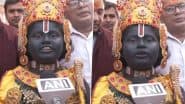Quetta [Pakistan], December 23 (ANI): On the 4th death anniversary of human rights activist Karima Baloch, the Baloch Yakjehti Committee (BYC) released a documentary titled "Brave Baloch Women" on its official YouTube channel.
According to a post by BYC on X, this documentary highlights the powerful and inspiring stories of Baloch women who have been at the forefront of social and political movements, challenging traditional norms and reshaping their roles in history. It serves as a tribute to their resilience, courage, and unwavering commitment to justice and equality.
Also Read | Pakistan Air Force Plans to Acquire 40 Planes of China’s Latest Stealth Fighter J-35: Report.
BYC's post stated, "Honouring the legacy of Karima Baloch and other iconic figures, Brave Baloch Women shines a light on their enduring contributions and the strength they bring to the contemporary struggles for rights and recognition." The committee also urged people to watch the documentary available on its YouTube channel.
Karima Baloch, who was the first female chairperson of the Baloch Students Organisation, fled Pakistan in 2015 and sought refuge in Canada after facing threats to her life for speaking out against enforced disappearances and extrajudicial killings by the Pakistani military.
On December 22, 2020, her body was found submerged in Toronto's waterfront under suspicious circumstances. Her family, as well as numerous politicians and activists, including the Baloch Yakjehti Committee (BYC), have claimed that she was murdered by the Pakistani state. Despite Canadian authorities ruling her death as "non-criminal," her passing has sparked significant concerns and demands for further investigation.
According to reports, Karima was last seen alive on December 20, 2020, and her body was found submerged in the Toronto waterfront on December 22, 2020. Initially, the Toronto Police Service reported her body was found near Lake Ontario, but offered no further details.
However, there were suspicions surrounding the circumstances of her death, as she had received threats prior to her death. Protests demanding a thorough investigation into Baloch's death took place both in Balochistan and Canada. Various ethnic groups, including Baloch, Pashtun, and Sindhi minorities, issued statements in support of the call for justice. Despite these concerns, Canadian authorities concluded that there was no evidence of foul play and deemed the death "non-criminal."
The situation surrounding Baloch's death raised alarm, especially given the context of her activism, the threats she had received, and her outspoken criticism of the Pakistani government. (ANI)
(This is an unedited and auto-generated story from Syndicated News feed, LatestLY Staff may not have modified or edited the content body)













 Quickly
Quickly

















